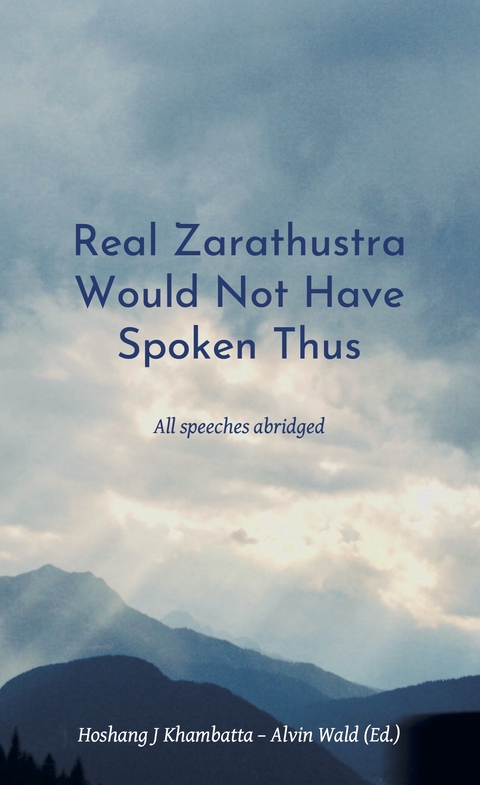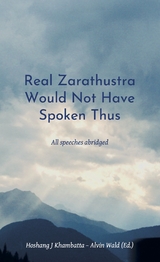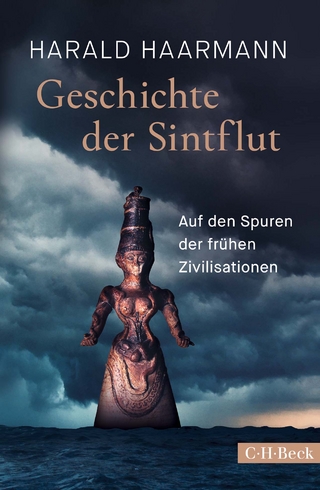Real Zarathustra Would Not Have Spoken Thus
All Speeches Abridged
Seiten
2022
Normed (Verlag)
978-3-89199-101-5 (ISBN)
Normed (Verlag)
978-3-89199-101-5 (ISBN)
XV
Introduction
I am a Zoroastrian, and so I was intrigued as to
why Friedrich Nietzsche, a German born philoso-
pher (1844–1900) would use Zarathustra to illumi-
nate his own philosophy in his text, “Thus Spoke
Zarathustra.” Zarathustra preached his religion
in Persia (now Iran) over 3000 years ago. Zara-
thustra said that man can either follow the good,
which he called the Righteous Path or follow the
Evil Path, which he called the Lie. The choice was
a matter of free will, the good being a religion
embodying Free Will par excellence. Free Will is
what Nietzsche believed in. According to him,
human values are created by humans, rather than
by the gods, or by nature or by some underlying
fundamental good. This interpretation was the
cause of considerable misunderstanding follow-
ing Nietzsche’s declaration that “God is dead.”
To him, God was an explanation for why human
beings behave the way they do. Once God is dead,
we can no longer blame Him for our values, our
judgements, and our behaviors. In Zarathustra’s
time people believed in multiple Gods. He was
the first prophet to say that there is only one
XVI
God who he called “Ahura Mazda” (Wise Lord).
This belief, perhaps, is the most important reason
why Zarathustra is inappropriate as Nietzsche’s
spokesman. About a millennia before Zarathustra
the Pharaoh Akhenaten enunciated the concept
of one God which he called “Sun,” the God. Zara-
thustra was opposed to entities such as Sun and
Water representing God. Akhenaten’s teachings
died soon after him.
Nietzsche called Zarathustra an Übermensch. Men-
sch is German for human/man. Über is difficult
to define in this context. It has been translated,
along with mensch as Overman or Superman. This
Superman is not the invincible man depicted in
comic books, but rather a further evolution of
mankind. I will use the term “Superman,” as it is
more appropriate in current colloquial English.
Nietzsche saw humanity as facing a crisis. Much
in Western philosophy longs for the afterworld.
In the Zoroastrian religion, at the end of time
there will be a Day of Judgment. On that day all
souls will pass over a narrow bridge, called: “The
Bridge of the Requiter/Separator.” Those who
have followed the evil path will fall off the bridge
into the abyss. Those who have followed the good
path will pass over the bridge and gain eternal life.
Nietzsche refers to this walk along the narrow
Introduction XVII
bridge a few times in this work. Zarathustra also
mentions this bridge where all souls will pass
along an ordeal of molten metal. The souls that
lead a righteous life will pass over without any
problem into heaven and those that lead an evil
life will be cleansed by the heat and eventually en-
ter heaven. Zarathustra was a prophet, hence one
step above the average person, and thus qualifies
as an Übermensch. That Nietzsche believed in Free
Will as did Zarathustra, was the justification for
him to be a spokesperson for his belief. The eighty
speeches delivered by Nietzsche’s Zarathustra,
have very little to do with the Zoroastrian faith
or with what history records. It would be fair
to say that that Zarathustra, in his capacity as a
prophet of the Zoroastrian faith, would not have
delivered over eighty percent of those speeches.
They are a product of Nietzsche’s own philosophy.
Zarathustra is delivering them in his capacity
as Nietzsche’s Übermensch – Overman/Superman,
not as a prophet of Zoroastrianism. All 80 speeches
have been abridged and transcribed in colloquial
English.
It is interesting to note that at the time Niet-
zsche was writing Thus Spoke Zarathustra his eye-
sight was failing, as was his general health and
his mental state. In fact, with what to us today
XVIII
might appear to be insurmountable difficulties,
he wrote the first there parts of Thus Spoke Za-
rathustra in just about 10 days each. Each part
was published separately but they were all com-
mercial failures as very few copies were sold. In
1891, it was thought that the Fourth Part, would
violate the existing German blasphemy laws and
thus result in Nietzsche’s indictment. Hence it
was not published. Eventually, in 1892, all Four
Parts were published at Nietzsche’s own expense,
without any mal consequences. Though the book
was a commercial failure in his lifetime, it posthu-
mously became his bestselling and most read
work.
It took Nietzsche just about a month to write
the entire book. It took me several months and
more than one reading, to absorb its contents.
After having spent so much time on the book, I
decided to publish, my own interpretation, in
an abridged version in colloquial English. Hope-
fully, unlike Nietzsche’s version, my version will
achieve some small success before its posthumous
appearance.
The late Professor Walter Kaufman, on the cover
of his book “Basic Writings of Nietzsche” has said
that “Nietzsche is one of the few philosophers
Introduction XIX
since Plato who a large number of intelligent
people read for pleasure.”
I hope that this brief interpretation of Nietzsche’s
most famous work will encourage the reader to
turn to the original, albeit in English, as it was
written in biblical style German, indubitably some
of the best prose in the German language.
– Hoshang J. Khambatta
March 2022
Introduction
I am a Zoroastrian, and so I was intrigued as to
why Friedrich Nietzsche, a German born philoso-
pher (1844–1900) would use Zarathustra to illumi-
nate his own philosophy in his text, “Thus Spoke
Zarathustra.” Zarathustra preached his religion
in Persia (now Iran) over 3000 years ago. Zara-
thustra said that man can either follow the good,
which he called the Righteous Path or follow the
Evil Path, which he called the Lie. The choice was
a matter of free will, the good being a religion
embodying Free Will par excellence. Free Will is
what Nietzsche believed in. According to him,
human values are created by humans, rather than
by the gods, or by nature or by some underlying
fundamental good. This interpretation was the
cause of considerable misunderstanding follow-
ing Nietzsche’s declaration that “God is dead.”
To him, God was an explanation for why human
beings behave the way they do. Once God is dead,
we can no longer blame Him for our values, our
judgements, and our behaviors. In Zarathustra’s
time people believed in multiple Gods. He was
the first prophet to say that there is only one
XVI
God who he called “Ahura Mazda” (Wise Lord).
This belief, perhaps, is the most important reason
why Zarathustra is inappropriate as Nietzsche’s
spokesman. About a millennia before Zarathustra
the Pharaoh Akhenaten enunciated the concept
of one God which he called “Sun,” the God. Zara-
thustra was opposed to entities such as Sun and
Water representing God. Akhenaten’s teachings
died soon after him.
Nietzsche called Zarathustra an Übermensch. Men-
sch is German for human/man. Über is difficult
to define in this context. It has been translated,
along with mensch as Overman or Superman. This
Superman is not the invincible man depicted in
comic books, but rather a further evolution of
mankind. I will use the term “Superman,” as it is
more appropriate in current colloquial English.
Nietzsche saw humanity as facing a crisis. Much
in Western philosophy longs for the afterworld.
In the Zoroastrian religion, at the end of time
there will be a Day of Judgment. On that day all
souls will pass over a narrow bridge, called: “The
Bridge of the Requiter/Separator.” Those who
have followed the evil path will fall off the bridge
into the abyss. Those who have followed the good
path will pass over the bridge and gain eternal life.
Nietzsche refers to this walk along the narrow
Introduction XVII
bridge a few times in this work. Zarathustra also
mentions this bridge where all souls will pass
along an ordeal of molten metal. The souls that
lead a righteous life will pass over without any
problem into heaven and those that lead an evil
life will be cleansed by the heat and eventually en-
ter heaven. Zarathustra was a prophet, hence one
step above the average person, and thus qualifies
as an Übermensch. That Nietzsche believed in Free
Will as did Zarathustra, was the justification for
him to be a spokesperson for his belief. The eighty
speeches delivered by Nietzsche’s Zarathustra,
have very little to do with the Zoroastrian faith
or with what history records. It would be fair
to say that that Zarathustra, in his capacity as a
prophet of the Zoroastrian faith, would not have
delivered over eighty percent of those speeches.
They are a product of Nietzsche’s own philosophy.
Zarathustra is delivering them in his capacity
as Nietzsche’s Übermensch – Overman/Superman,
not as a prophet of Zoroastrianism. All 80 speeches
have been abridged and transcribed in colloquial
English.
It is interesting to note that at the time Niet-
zsche was writing Thus Spoke Zarathustra his eye-
sight was failing, as was his general health and
his mental state. In fact, with what to us today
XVIII
might appear to be insurmountable difficulties,
he wrote the first there parts of Thus Spoke Za-
rathustra in just about 10 days each. Each part
was published separately but they were all com-
mercial failures as very few copies were sold. In
1891, it was thought that the Fourth Part, would
violate the existing German blasphemy laws and
thus result in Nietzsche’s indictment. Hence it
was not published. Eventually, in 1892, all Four
Parts were published at Nietzsche’s own expense,
without any mal consequences. Though the book
was a commercial failure in his lifetime, it posthu-
mously became his bestselling and most read
work.
It took Nietzsche just about a month to write
the entire book. It took me several months and
more than one reading, to absorb its contents.
After having spent so much time on the book, I
decided to publish, my own interpretation, in
an abridged version in colloquial English. Hope-
fully, unlike Nietzsche’s version, my version will
achieve some small success before its posthumous
appearance.
The late Professor Walter Kaufman, on the cover
of his book “Basic Writings of Nietzsche” has said
that “Nietzsche is one of the few philosophers
Introduction XIX
since Plato who a large number of intelligent
people read for pleasure.”
I hope that this brief interpretation of Nietzsche’s
most famous work will encourage the reader to
turn to the original, albeit in English, as it was
written in biblical style German, indubitably some
of the best prose in the German language.
– Hoshang J. Khambatta
March 2022
| Erscheinungsdatum | 01.10.2022 |
|---|---|
| Co-Autor | Alvin Wald |
| Verlagsort | Bad Homburg |
| Sprache | englisch |
| Maße | 110 x 180 mm |
| Gewicht | 200 g |
| Einbandart | gebunden |
| Themenwelt | Literatur |
| Geschichte ► Allgemeine Geschichte ► Vor- und Frühgeschichte | |
| Schlagworte | introductions • Religion • Zarathustra • Zoroastrianism |
| ISBN-10 | 3-89199-101-0 / 3891991010 |
| ISBN-13 | 978-3-89199-101-5 / 9783891991015 |
| Zustand | Neuware |
| Haben Sie eine Frage zum Produkt? |
Mehr entdecken
aus dem Bereich
aus dem Bereich
Was Pompeji über uns erzählt
Buch | Hardcover (2023)
Propyläen (Verlag)
29,00 €
auf den Spuren der frühen Zivilisationen
Buch | Hardcover (2023)
C.H.Beck (Verlag)
20,00 €
die Zukunft des Westens und der Alte Orient
Buch | Hardcover (2023)
Klett-Cotta (Verlag)
25,00 €




